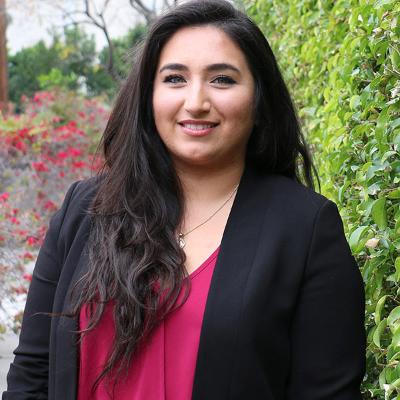Immigration Paralegal Uses Loyola Degree to Bolster Advocacy Skills
Chloe Neblina ’19 decided to go to law school after working as a legal assistant and paralegal defending unaccompanied minors at the non-profit Kids in Need of Defense (KIND). Joining the Loyola Immigrant Justice Clinic (LIJC), the first law school-housed community-based immigration clinic in the United States, gave Neblina the hands-on training she needs to become a better advocate undocumented children. [Watch Chloe’s testimonial video]
Q. Why did you decide to pursue law school, and how did Loyola's clinical offerings impact that decision?
A. I decided to pursue law school because I wanted to make a difference in the world. Working for KIND confirmed that the impact I wanted to make would only be possible if I were an attorney. I was drawn to Loyola Law School, Los Angeles because it offered practical training through its clinics that would help me become a great immigration attorney.
Q. How did your participation in your clinic make a difference in your Loyola education?
A. Loyola has incredible professors, and the classes taught me a lot, but my clinical work taught me more about what I will actually do as an attorney. For example, as part of LIJC, I had the opportunity to represent a client in front of an immigration judge. Learning court etiquette and experiencing the nervousness that comes from your first court appearance is invaluable. Every student should take advantage of these opportunities.
Q. What has been the most memorable part of your experience?
A. My most memorable experience has been appearing alone before a judge. I felt like I was actually advocating for my client and it reaffirmed that this work is meant for me.
Q. What about your clinical experience surprised you?
A. My clinical professors surprised me the most. I knew they were amazing advocates from all the work they had done, but I was expecting more of a professor/student relationship. However, they created an environment where we, the clinical students, are more like associates completing assignments for our supervisors in a law firm. LIJC Co-Director Emily Robinson ’12 went out of her way to help me with my filings, review my work and give me constructive feedback. It made me feel supported and like I had all the tools I needed to be the best advocate.
Q. How did it feel to put your classroom knowledge to work for clients?
A. It's neat to apply what I have learned, but getting hands-on experience makes you realize how much you still don't know. My immigration course taught me where to find the laws that help protect my clients, and the clinic has taught me how to apply that knowledge practically so I achieve get results and protect my client's rights, and at times even their lives.
Q. How has your clinical experience prepared you to be an attorney for others?
A. The work at the clinic gives you access to real clients and real people who have often suffered trauma. It taught me the importance of trauma-informed lawyering and how to be an advocate for people, not numbers. Immigration law, and laws generally, are not empathetic and don't take into account people's circumstances, fears or struggles. I've learned it's my duty to use the tools given to me to help my clients in a compassionate way.
Q. Finish this sentence: "If my time in the Loyola Social Justice Law Clinic has taught me anything, it is _________"
A. That I am in the right field. This is the work I was meant to do.
The work we do at Loyola matters. Find out more or apply today.
